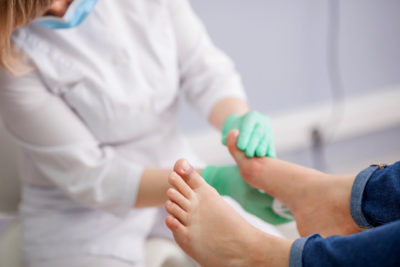What is a Bunion?
A bunion is a noticeable, hard bump that develops at the base of your big toe. If the bones near the front of your foot become misaligned, your big toe pulls forward and places pressure on your smaller toes. This forces the joint at the base of your toe to stick out. It’s also possible to develop a bunionette or tailor’s bunion on your little toe.
The most common cause of bunions is wearing tight, uncomfortable shoes or shoes without an adequate toe box. However, other contributing factors include foot deformities, chronic conditions such as arthritis or rheumatoid arthritis.
Symptoms of a Bunion?
Bunions vary in size and severity. However, common telltale signs include:
- A bony growth on the base of your big toe. Don’t ignore these bumps and keep an eye on their growth.
- Swelling or redness around your big toe joint. If it’s not a stubbed toe, you could be facing a bunion.
- Persistent pain that comes and goes. Pain is your body’s way to tell you to seek help.
- Corns or calluses on your big toe. These are easily treated. Call us today.
As your bunion gets worse, you also might find it difficult to bend or straighten your big toe. You might also develop hammertoe. Hammertoe is a similar but more challenging condition to treat.
Should I See a Doctor for a Bunion?
Even if your bunion isn’t causing you pain or interfering with your mobility, it’s important to schedule a consultation at Family Foot & Ankle Physicians. Let’s take a look and make sure you have a plan on how to deal with potential bunions on your feet.
It’s also important to seek professional help if your bunion continues to grow in size, or it becomes red or swollen.
Who Gets Bunions?
Bunions affect people of all ages. However, you’re at a higher risk of developing a bunion if you:

- Women are more likely to wear high heels, hence get bunions.
- Have flat feet or fallen arches can cause bunions.
- Wearing tight or ill-fitting shoes.
- Have a family history of bunions.
- Have an improper gait or walking pattern.
- Have rheumatoid arthritis or another chronic arthritis issue.
You’re also more likely to develop a bunion if you have other podiatric problems such as hammertoe, bursitis, or metatarsalgia.
How are Bunions Treated?
Depending on your symptoms, you may need to wear more comfortable, padded shoes, custom shoe inserts, or take over-the-counter pain medications to relieve swelling and pain.
If these methods of care don’t provide adequate relief, surgery may be necessary. There are a variety of surgical procedures designed to address bunions. Following a physical exam of your foot and a review of your medical history, your doctor develops a plan that aligns with your unique needs.
If a bunion is affecting your quality of life and mobility, make an appointment at Family Foot & Ankle Physicians today. Family Foot & Ankle Physicians has a primary location in Greenville, servicing cities such as Greenville, Farmville, Ahoskie, Kinston, Winterville, Tarboro, New Bern, Edenton, Washington, Rocky Mount, with patients coming from throughout eastern North Carolina and beyond. To request your appointment, call our Greenville office today, talk to your doctor about a referral or use the online booking tool to schedule your visit.
